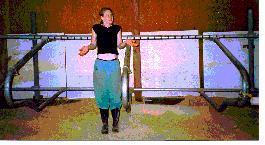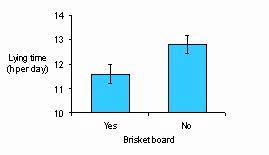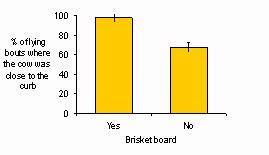In building a new barn, or in renovating an existing facility, we aim to create a comfortable and relatively clean environment for the cow to lie down. The brisket board is thought to help keep the stall clean by preventing cows from moving forward in the stall. However, like other hardware used to position the cow in free stalls, we need to understand the effects of the brisket board on cow comfort.
To understand how the brisket board affects cow behaviour, we housed cows with access to two stalls: one stall had a wooden brisket board (2”x8” installed at a 30 degree angle) and the second stall did not contain a brisket board. We measured how much dry cows used each stall when they could choose between the two options (preference test) and how their behaviour changed when they could only use a single option.

UBC Researchers performed an experiment to “ask” cows which stall they prefer, a stall with a brisket board (right), or without a board (left). Cows preferred to lie down in stalls without a brisket board.
Cows spent more time lying down per day in a stall without a brisket board (1.2 hours per day more; Figure 1). They also had longer lying bouts in the stall without a board. This result is similar to the effect of free-stall width, where cows have longer lying bouts in wide stalls compared to narrow stalls. Cows may shorten their lying bouts in narrow stalls and stalls with brisket boards because both stall partitions and boards may be uncomfortable to lie against. The presence of the brisket board also influenced cow placement in the stall. Cows lay farther forward in the stall without a brisket board (Figure 2). The brisket board particularly affected the placement of long cows (> 125 cm between wither and tail head), pushing these cows closer to the curb than shorter animals.

Figure 1. Cows spent more time lying down in stalls without a brisket board.

Figure 2. Cows lie closer to the curb when there is a brisket board in the stall. By preventing the forward movement, brisket boards may help keep stalls clean. Distance to the curb was measured by recording the location of the withers relative to the neck rail (125 cm high and placed 160 cm from curb).
When given a choice between using a stall with or without a brisket board, we found that cows spent 68% of their time lying in the stall without a brisket board. Cows prefer stalls without brisket boards, and when they are forced to use stalls with brisket boards they spend less time lying down in total, and lie down for shorter periods of time.
It is possible that other designs of brisket board disturb cows less. For example, brisket boards that are rounded, lower or softer may represent less of a barrier to lying behaviour. Judging if any barrier is necessary requires better information about how effective these are in improving stall cleanliness. To date, no research is available to judge the effects of brisket board design or placement on stall cleanliness. It is important to note that, like the neck rail, the effects of the brisket board will depend upon cow size. Also the negative effects on cow comfort might be especially important for the more vulnerable cows in the herd, such as those that are lame.
Other research from our laboratory has shown that barriers to stall use (such as aggressive neck rail placement) are in general a poor way of keeping stalls clean, in much the same way that losing your keys to the pickup is probably not the smartest way to save gas. We recommend that producers experiencing difficulties with cow comfort consider removing the brisket board from at least some of the stalls in their free stall barn.
Watch for future research reports on the topic of alternative flooring surfaces for free-stall barns.
For more information, please visit the UBC Animal Welfare Program website.
This article is based on post doctoral research of Cassandra Tucker and research assistant Gosia Zdanowicz. Dan Weary is a Professor in the Animal Welfare Program and can be reached at danweary@interchange.ubc.ca
